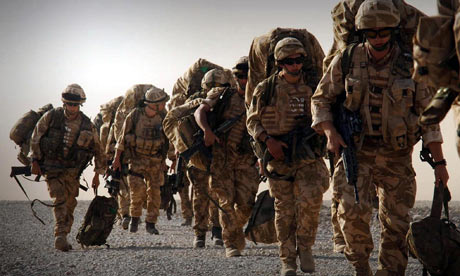Cuts to the armed forces could lead to thousands more combat veterans from Iraq and Afghanistan needing help to cope with a range of mental illnesses, including post-traumatic stress disorder, a charity has warned.
With the British army being cut by a fifth between now and 2020, and the navy and air force shrinking too, the numbers leaving military service are rising fast. This could put an extra burden on the NHS to care for battle-scarred troops, according to Combat Stress.
The charity says many personnel are unable to acknowledge they have a problem and that it takes 13 years on average before a veteran will seek help voluntarily, by which time they may have done further damage to themselves as well as their families.
It fears the problem could become acute because of the cost-cutting redundancy programme started by the Ministry of Defence earlier this year, and has called on the government and doctors to do more to support veterans once they have left service.
The charity's chief executive, Commodore Andrew Cameron, said: "Much more needs to be done by front line clinicians and GPs to help veterans' suffering from mental illnesses.
"More needs to be done to proactively identify [them]. Service personnel leaving the armed forces should be more thoroughly screened for PTSD [post-traumatic stress disorder] and other mental illnesses and GPs should be better informed about which of their patients have served in the armed forces and the possible effects of battlefield trauma.
"We cannot allow the many servicemen and women who will leave the armed forces next year who may be suffering from trauma-related mental wounds to go unnoticed and untreated."
The charity has been providing support to veterans suffering from mental health issues since 1919 and is currently helping 4,800 people, including 228 who served in Afghanistan and 589 who served in Iraq. Two of the veterans are teenagers.
Last year a report published in the Lancet indicated that 4% of those serving in Iraq and Afghanistan reported suffering from probable PTSD, and 19.7% symptoms of common mental disorders such as anxiety. It also raised concerns over the misuse of alcohol.
The study said there was "no evidence the number of deployments was associated with an increase in the reporting of probable mental disorders" and that the mental health of the armed forces was not deteriorating. However, it said this finding was "surprising".
Combat Stress believes many veterans refuse to admit they may have a problem, even for studies where they are responding anonymously.It claims that if last year's report is accurate, there are potentially thousands of men and women who will need help of some kind in the coming years.
One veteran, James Saunders, 42, told the Guardian he was first diagnosed with PTSD more than 10 years after leaving service in the early 1990s.
"My life became a train crash," he said. "I lost everything in that time. It didn't occur to me that I could be suffering from PTSD. The doctors in the NHS didn't seem to have any idea how to deal with me. There is a stigma attached to mental illnesses … many servicemen and women will leave the military unaware that they may need help."
An MoD spokesman said the military already had a range of initiatives to help troops in service, and that the government had earmarked £7m in additional funding "over the next four years to help ensure that veterans with mental health problems get the very best care".
"The MoD works to identify and treat the early signs of mental distress through its Trim [Trauma Risk Management] system. In Afghanistan a team of community psychiatric nurses and consultant psychiatrists are on hand to help troops talk through any problems they may have and to provide any care and treatment needed."
Nick Hopkins, The Guardian












0 Comments